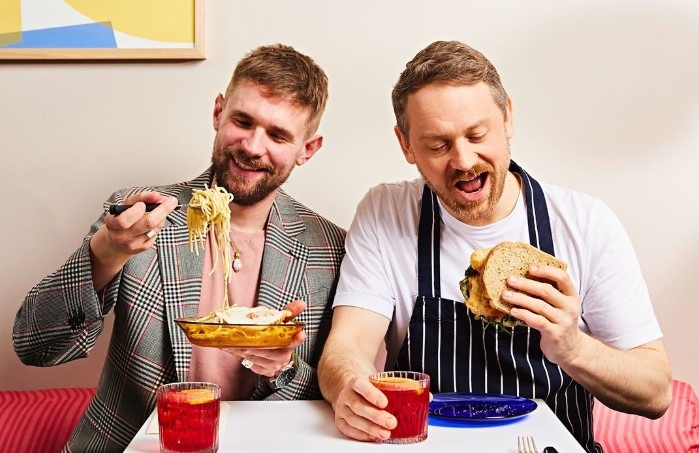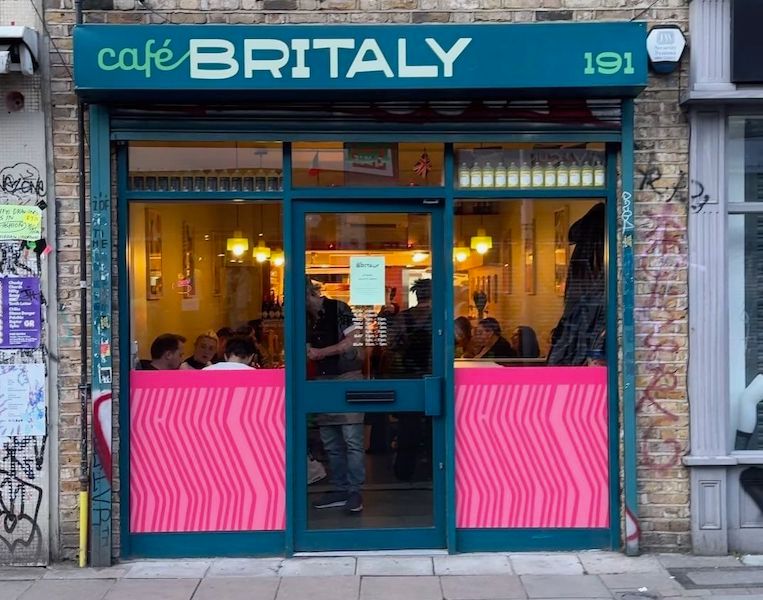
Chef Alex Purdie (right in photo) opened Café Britaly in May this year with co-founder Richard Crampton-Platt (left), who runs the front of house. On bustling Rye Lane in Peckham Rye, it feels much more like a local London caff than a River Café-style restaurant: a simply decorated shop unit with a pavement chalk board advertising ‘brunch – booze – coffee – carbs’ and a menu offering hearty dishes including the signature ‘Britalian carbonara’ topped with a fried egg and deep-fried battered pizza – ‘Scotalian’, as Scottish-born Alex suggests.
Alex had only been a professional chef for three years when he opened Café Britaly, having switched from a career in management consultancy as recently as 2021. Harden’s sat down with him between busy lunch and dinner services on a Saturday afternoon to ask him how – and why – he did it.

HARDEN’S: Alex, very many people go straight into hospitality because it’s what they always wanted to do; others drift into kitchens almost by chance and stay there. You switched after 10-years in another professional career – possibly not for the money! How did that come about?
Alex: I was a management consultant working in the sports sector with Mott Macdonald, a large global consultancy. When Covid came along some people got a dog, some people moved in with their partners, while I ended up completely changing careers. I had always loved food and loved cooking, and slowly my home cooking became more ambitious; baking bread, making pasta, and working my way through the mother sauces.
In the end I found myself asking Jake Simpson [then head chef] at Bocca di Lupo – a restaurant I loved – if I could come and work in the kitchen. He suggested I come in to do a ‘stage’ for a week. I said yes, but had to go to Google to find out what a ‘stage’ was!
I immediately felt at ease and at home in the kitchen – I just loved it, and wanted to soak up everything. I remember spending two hours deep-frying aubergine, and told my partner about it when I got home – she just couldn’t understand how anybody could enjoy that!
The week in the kitchen also made me recognise that the people around me in consultancy were passionate about their job – I enjoyed it, but it just wasn’t my passion. I also find it hard to switch off from my work, so I decided that if I was going to put so much energy into something, it should be my passion.
When Bocca di Lupo offered me a job, it just felt right for my physical and mental health to take it. Also, I managed to get a year’s sabbatical from the consultancy, so I wasn’t burning my bridges.
How was going in to the kitchen as a ‘mature’ starter? Were you able to bring transferable skills from your previous career?
At first it was quite daunting, I think a lot of other chefs looked at me and wondered what the hell I was doing! But I was able to bring tranferable skills, in consultancy you get used to wearing a different hat every day, and that was incredibly useful when entering the kitchen for the first time.
I knew I had to work really hard to make the most of the opportunity – even if I just had a year in the kitchen, I wanted to get as much as possible from it.
From the other side, naturally it is the best cooks who get promoted in kitchens. But they’ve not necessarily had the best training in leadership skills or communication skills, or computer skills for some of the more managerial or administrative tasks required.
So you were promoted pretty quickly?
Yes, but when I was promoted to sous chef I realised I was moving too fast for my own good. I was back in front of the computer, managing people, some days running the kitchen, but not enough time hands-on cooking. I didn’t feel going back to chef de partie in the same kitchen was the right decision – I felt I needed to broaden my skills by working somewhere else so I decided to leave Bocca di Lupo.
When I talked this through with Jacob Kenedy he said that if he could go into any kitchen in London it would be Bouchon Racine (having launched a few months earlier it was an instant success). I understood the importance of the basic foundations of French cooking to any chef and Jacob was able to put me in touch with Henry Harris and Dave Strauss at Bouchon. After an initial chat with Henry and a trial in the kitchen, I joined to team there about 3 months into their opening. I was incredibly lucky to have the time I did in that kitchen.
What led you to opening Café Britaly? Had that been the plan all along?
No – it was another case of things moving more quickly than I had anticipated. I had worked with Richard at Bocca di Lupo, where he was operations director, and one day he dropped in for lunch at Bouchon Racine and we started talking. He was very keen on the traditional café idea, and I was keen to elevate that slightly, pushing it in a direction where the food is more freshly prepared using quality produce, and adding some more traditional dishes alongside other comforting Britalian creations.

The idea of ‘Britalian’ food is interesting. We still go out (or get a delivery) to eat Indian or Thai food on the whole, but Brits have been home-cooking ‘Italian’ food for a generation or two now.
Yes, it’s comfort food for us – the spag bol I grew up with, cooked by my mum. But the year and a half I spent at Bocca di Lupo learning the established, traditional Italian foundations is part of it too.
I love the multiculturalism of food. You see it in this area of London, and when I travel I spend a lot of time wondering what I am going to eat. I really love Japanese food, for instance – it’s a cuisine I’d love to learn more about, perhaps that could be my next direction.
Soon after opening, Café Britaly got a very positive review in the Standard from Jimi Famurewa. How important was that recognition, and did social media help?
It was great – everything helps, and shows we’re doing something right. But the most important thing for us is remembering that we’re a local place, remembering the guys outside the door, the people walking past. Most of our customers live locally, and I’m a local myself – I’ve lived in Peckham for 10 years.
We’ve got a lot of local regulars already; we listen to what they say and try to adapt to what they like. So for instance, they told us they wanted mid-priced wine available by the carafe, and they wanted more sharing-style small plate menu for dinner, and we’ve responded to that.
Going back to your previous career again, what has that experience brought to opening a new place?
Richard and I sit down face-to-face every week to look at the financial position and discuss strategy, and we always make sure that senior members of staff are on the same wavelength.
Seven months after opening we’re still here, and we know that there is still a long way to go. But in the back of our minds we are keen to grow and do discuss what that might look like. We are certainly ambitious to open other restaurants in southeast London and further afield.
